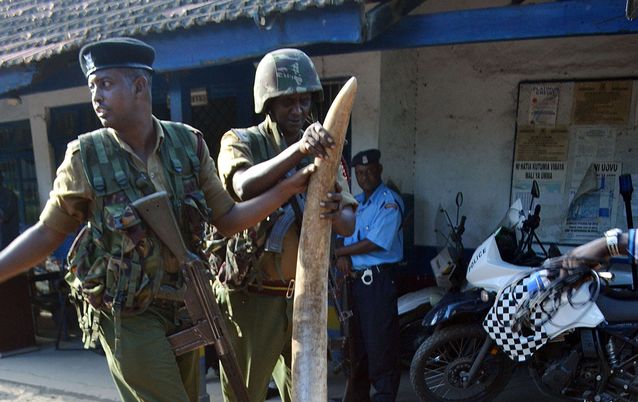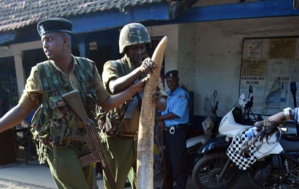The ongoing conflicts in Africa and the Middle East is not fuelling hatred and the proliferation of all kinds of weapons, such as sub machine guns, primary assault rifles, hand grenades, self-loading pistols, portable anti-tank guns, rockets, and anti-aircraft guns, but as per the Small Arms Survey 2015, some of these are trickling down to poachers who use it to misappropriate the mineral riches of the earth as well as wantonly butcher wildlife for huge profits. As per the report, the poaching of rhinos and elephants is increasingly militarised.
With the increase in demand for rhino horns and ivory, the forest guards and the poachers are both increasingly using military grade weapons and adopting aggressive tactics. For example, as per the report, the population of elephants in Africa are in decline and the illegal butchering of rhinos for their horns have gone up dramatically.
As per the World Wildlife Fund (WWF), the illegal trading of rhino horns threatens the very survival of the species and although the efforts to re-introduce rhinos to protected areas in South Africa has seen a level of success, the rate of poaching has not changed course but has instead accelerated. Paula Kahumbu, a leading conservationist and executive director of WildlifeDirect, says that today’s wildlife crime threatens the survival of endangered and vulnerable species in many African countries.
She went on to say, “Worse, poor law enforcement and corruption among government officials and security officers facilitate wildlife crime and trafficking.” As per documented evidence by a NGO based out of Kenya, legal penalties designed to deter such crimes have had hardly any impact on such crimes committed by traffickers and poachers.
Interestingly climate change also plays a part in these conflicts, as per the report. Traditionally, fighting comes to a grinding halt during the rainy seasons and it resumes when the soils allows the navigation of vehicles on unpaved roads. The rains play a major role to the extent that the water content of the terrain even influences battle tactics.
“In some parts of the world, rainy seasons are now shifting in time and intensity. As global warming alters temperature, rainfall and sea levels, as many expect it will, it is almost certain to affect armed violence and armed conflict in ways that for now are predictable,” says the report.
These weapons are also responsible for the illegal mining of natural resources with the result that virtually overnight remote outposts turn into urban hubs which spurs insecurity and violence amongst local communities as different groups compete for the spoils of war.
This report, produced annually with the help and support of the Swiss Federal Department of Foreign Affairs along with several other western nations, also sheds lights on the increasing number of private security firms, floating armouries, small arm trades and the UN’s programme of Action to track the flow of illegal weapons.
As per available statistics from the United Nations, the biggest exporters of light weapons and small arms are, United States, Italy, Germany, Brazil, Austria, South Korea, Russia, China, Belgium, the Czech Republic, Turkey, Norway and Japan.
With a continuous flow of small arms to these bands of armed groups, as per the report, the net effect is that they “are better armed (today) than they were a decade ago. Of particular concern is jihadist possession of man-portable air defence systems (MANPADS), although many of these may be inoperable.”
Although many of these weapons which are used by insurgent groups consists are largely from the Soviet Cold War-era ”but they also use more recently-produced materiel from Bulgaria and China, among other states.”
As per the report, there is little evidence the “Arab Spring” has had a significant impact on the policies of major exporters of small arms to the region. Libya is the only state affected by the uprisings to be subject to a U.N. arms embargo. And efforts to impose such an embargo on Syria have failed, and the option has not been discussed with regard to Egypt.
References:
http://www.ipsnews.net/2015/06/small-arms-proliferation-a-trigger-for-rising-wildlife-crimes/
With the increase in demand for rhino horns and ivory, the forest guards and the poachers are both increasingly using military grade weapons and adopting aggressive tactics. For example, as per the report, the population of elephants in Africa are in decline and the illegal butchering of rhinos for their horns have gone up dramatically.
As per the World Wildlife Fund (WWF), the illegal trading of rhino horns threatens the very survival of the species and although the efforts to re-introduce rhinos to protected areas in South Africa has seen a level of success, the rate of poaching has not changed course but has instead accelerated. Paula Kahumbu, a leading conservationist and executive director of WildlifeDirect, says that today’s wildlife crime threatens the survival of endangered and vulnerable species in many African countries.
She went on to say, “Worse, poor law enforcement and corruption among government officials and security officers facilitate wildlife crime and trafficking.” As per documented evidence by a NGO based out of Kenya, legal penalties designed to deter such crimes have had hardly any impact on such crimes committed by traffickers and poachers.
Interestingly climate change also plays a part in these conflicts, as per the report. Traditionally, fighting comes to a grinding halt during the rainy seasons and it resumes when the soils allows the navigation of vehicles on unpaved roads. The rains play a major role to the extent that the water content of the terrain even influences battle tactics.
“In some parts of the world, rainy seasons are now shifting in time and intensity. As global warming alters temperature, rainfall and sea levels, as many expect it will, it is almost certain to affect armed violence and armed conflict in ways that for now are predictable,” says the report.
These weapons are also responsible for the illegal mining of natural resources with the result that virtually overnight remote outposts turn into urban hubs which spurs insecurity and violence amongst local communities as different groups compete for the spoils of war.
This report, produced annually with the help and support of the Swiss Federal Department of Foreign Affairs along with several other western nations, also sheds lights on the increasing number of private security firms, floating armouries, small arm trades and the UN’s programme of Action to track the flow of illegal weapons.
As per available statistics from the United Nations, the biggest exporters of light weapons and small arms are, United States, Italy, Germany, Brazil, Austria, South Korea, Russia, China, Belgium, the Czech Republic, Turkey, Norway and Japan.
With a continuous flow of small arms to these bands of armed groups, as per the report, the net effect is that they “are better armed (today) than they were a decade ago. Of particular concern is jihadist possession of man-portable air defence systems (MANPADS), although many of these may be inoperable.”
Although many of these weapons which are used by insurgent groups consists are largely from the Soviet Cold War-era ”but they also use more recently-produced materiel from Bulgaria and China, among other states.”
As per the report, there is little evidence the “Arab Spring” has had a significant impact on the policies of major exporters of small arms to the region. Libya is the only state affected by the uprisings to be subject to a U.N. arms embargo. And efforts to impose such an embargo on Syria have failed, and the option has not been discussed with regard to Egypt.
References:
http://www.ipsnews.net/2015/06/small-arms-proliferation-a-trigger-for-rising-wildlife-crimes/


 The proliferation of the illegal sale of small arms is triggering the butchery of wildlife in Africa
The proliferation of the illegal sale of small arms is triggering the butchery of wildlife in Africa





 Companies
Companies